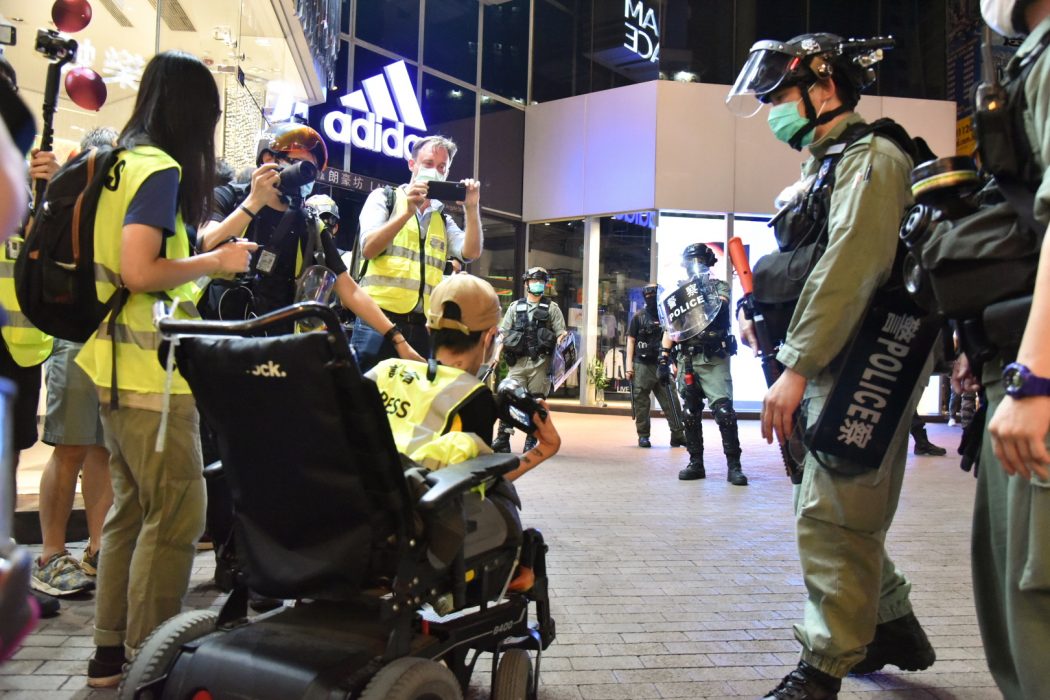By Kevin Cheng
Tommy Wong is a Hong Kong protester-turned-journalist with a difference. He reports on the city from a wheelchair. Born with muscular dystrophy, his condition has not hampered his ability to cover events during the past year of political discontent.
“I am no different from most people, both physically and mentally. The only difference is that I have an electronic wheelchair as my legs,” Wong told HKFP.

After attending peaceful pro-democracy marches in Hong Kong last year, initially against an ill-fated extradition treaty with mainland China, Wong could not join the protest front lines due to safety concerns. Undeterred, he decided to continue to report on calmer events and joined local pro-democracy media platform White Night Media.
Commenting on the biggest difference between being a protester and a reporter, Wong said it was not being able to incorporate his opinions into reporting: “Being a reporter, we have to be objective in our reporting and be critical of what is happening at the frontline. Though we cannot be completely neutral, I have to try hard to be objective in order to report the truth.”

“To stand one step back makes me feel less emotional. When I was a protester, I was overwhelmed by my feelings, but now I have another perspective.”
In the course of his reporting, he has been motivated by the kindness of strangers, who clear the way for him when they see him approaching, wearing a yellow press vest. Others have offered him food and water.
“These are very kind gestures. Some people might think the work I’m doing is tough, so they encourage me. Care from passersby during the protests have left a very warm and deep impression on me,” he said.

Although the Disability Discrimination Ordinance dictates requirements for barrier-free access facilities for the city’s disabled, Hong Kong’s narrow streets and its abundance of stairs and escalators can still make it a difficult and inaccessible city to those using wheelchairs.
“It only takes one elevated step… and I can’t pass through,” he said.

Being a wheelchair reporter comes with other challenges: “I have to hold the camera and to control the wheelchair at the same time. To do two things at once is the most challenging thing for a wheelchair reporter,” he explained.
Another cause of frustration also comes from the police. Being a handicapped reporter has not exempted him from mistreatment: “Once when I was in Tuen Mun with my friends, we passed by the police and I heard them say ‘Wow, how come a [handicap] like him be a journalist?” he said.
” I think as a public servant, [the officer] should not say discriminatory things like this to journalists or citizens.”

Once, while covering a protest in Sha Tin’s New Plaza, police closed off most exits and started deploying pepper spray and using batons within the mall. The only available exit was a narrow door connected by a step. This meant Wong was effectively trapped within the building with the riot police.
Recalling the pandemonium, Wong said: “It was chaos, the police don’t care if you are in a wheelchair or not. They push forward with their batons. They might or might not hit you – it was so crowded and you cannot just leave. It was dangerous.”

But these dangers have not shaken his resolve. Asked whether the people close to him are scared for his well-being while he is at work, Wong dismissed concerns: “Not really. I am not worried.”
“I will do as much as I can. I don’t live with my family, I don’t have a girlfriend. I take responsibility for myself. My friends and family know the risks that I’m taking and remind me to be careful.”
“Shooting from the frontline is risky but I think what I am doing is right. I have chosen my path, and will stand firm.”

Being a wheelchair reporter enables him to see what others do not see and add new angles to reportage on the city, he said: “I should not give up because it is scary. I choose to do it because it is worthwhile to do so.”
Translations by Viola Kam.
